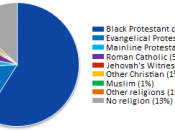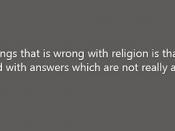Identifying the roots of political conflict is notoriously difficult, and, as wars continue to rage, religion and ethics are very often seen as the motivating forces. So, is religion really the cause of conflicts and crimes?
I'd like to ask why there is so much violence surrounding Israel. Why are innocent sufferings in Afghanistan? Why is political unrest still prevailing in the world? Is there a rational explanation to all these issues?
Here it is significant to note that the fundamental role of religion cannot be dismissed. When you get right down to it, if it weren't for religion, it's unlikely that there would be much violence surrounding the present world order. Thus the question is not so much whether religious faith can influence the course of conflicts - this is without doubt -, but rather when religious faith has an escalating and when a de-escalating effect.
Religion is a powerful factor in conflicts around the world.
Sometimes it is a cause for conflict, sometimes it helps sustain conflict, and other times it is used as a pretext for conflicts that have deeper roots in other issues.
The Crusades is a shining example of a conflict that flourished from a difference in religions. The Europeans had called their Christian army more civilized then to the so called infidels they were fighting. No religion has a right to declare war on each other just because of "holy" land. The Pope had asked the people to fight in an unknown territory to regain the holy lands, in which if one does so, his sins will be forgiven. People left their wives, children, parents, family, and friends to fight in this "Holy War" just because the Pope had declared that fighting is forgivable and you will enter heaven after death. Sure the Crusades had brought Europe out of the Dark Ages but at what cost; at the cost of the lives perished by the sword which could never be healed.
So, the gist is that people do die. May it be in the name of religion, in the name of country or in the name of family. BUT people do die. They do suffer. They suffer in the name of their Faith. They suffer to resolve conflicts and to endorse peace.
The immediate aftermath of the terrorist attacks on the United States was that the Western political leaders were anxious to stress that their war was not against Islam, a religion they hailed to be peace loving and tolerant. Muslim leaders in the United States and Europe endorsed this perception of their faith by quickly dissociating themselves from their co religionists, who had claimed responsibility for the atrocities. Islam, they claimed, had been hijacked for political purposes. The media endorsed the prevailing mood, declaring that grievance of the frustrated Al-Quaida terrorists, and not creed, was the rationalization behind the indiscriminate killing in New York and Washington.
So, here I would like to point out that what had caused their 'FRUSTRATION'. It definitely was, madam president, due to the mistaken perception of the Americans towards Islam.
The world cannot survive without a new global ethic, and religions play a major role, as parties in violent conflicts, as passive bystanders, as active peace-makers and as peace-builders. Hans Küngs' thesis was that there can never be world peace if a religious peace is not attained. Representing two thirds of the world population, religions have a major responsibility in creating a constructive conflict culture.
It is true that all religions aspire to peace but it is questionable whether religion has ever fulfilled that role. The fact that all major world faiths have at times sanctioned the use of violence to protect or to promote their own sectarian interests, allows religious terrorists today to claim moral justification for their actions. The faith inspired terrorist can find, in his or her religious tradition, role models that give legitimacy to their own use of violence.
The present priority should be to lessen the risk of religiously motivated conflict by promoting confidence building and understanding among peoples of different political cultures and faiths, and especially between Islam and the West. A paradigm shift in political thinking is also essential if we are to curtail an intensification of religiously motivated violence.


